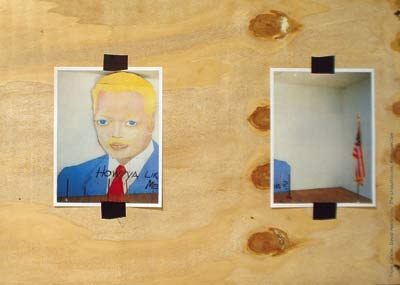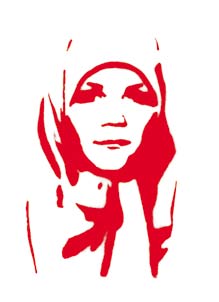 |
 |
|
|||
| Triple Candie, David Hammons. The Unauthorized Retrospective (detail), 2006 | Azin Feizabadi, from Repitition-Revolutions-Rituals | |||
|
Art
and Law IV Artists:
Azin Feizabadi, Gilbert & George, Christian de Lutz, Triple
Candie Workshop,
28 November 2009, 3PM The exhibition Creative Rights. On Appropriation, Copyright and Copyleft investigates questions concerning the use, re-use and misuse of images and information in the contemporary art world from artistic, legal, political and philosophical viewpoints. Since the late 1970s appropriation of images and information by such artists as Sherrie Levine and Richard Prince has become a common and accepted technique, part and parcel of postmodernism's critical approach. Indeed it follows a tradition that goes back through pop art and nouveau realisme to Dada and cubist collage. Not without ethical, aesthetic and legal controversy, a number of law cases involving appropriation seems to have increased in recent years involving artists such as Jeff Koons, Richard Prince and Shepard Fairey The exhibition Creative Rights consists of three parts: The exhibition with four artistic positions, the Creative Rights Library with extensive material on the presented artists and other recent law cases as well as a workshop on the theme of copyright. The exhibition shows four positions offering unique views on appropriation, fair use (a term defining legal use of images outside of copyright restrictions) and 'copyleft'( the decision of the artist to forego the protections of copyright). Triple Candie (curatorial duo Shelly Bancroft and Peter Nesbett) provoked controversy in 2006 with their exhibition David Hammons: The Unauthorized Retrospective in which they exhibited color and black and white copies from books, brochures, catalogues and websites documenting the work of the American artist David Hammons. The resulting exhibition, part of which is on display in Creative Rights as a curatorial quotation, cast a unique critical light on both Hammons work and art world traditions, and was both highly praised and criticised. Repetitions-Revolutions-Rituals by the Iranian-German artist Azin Feizabadi documents a project started by the artist in 2004 when he sprayed an image of a woman in a headscarf using a stencil throughout the Kreuzberg district of Berlin. The work was initially an homage to his mother, the artist Farkhondeh Shahroudi, who as an 18 year old during the Iranian Revolution, sprayed left wing graffiti in Tehran. In 2006 the German glossy newsweekly Focus used a photograph of the image for its cover, with the words 'The Multi-cultural Lie" stamped over it. Feizabadi has chosen to 're-appropriate' the image by signing the magazine and displaying it as an artwork. His accompanying text contrasts the work's original context with the magazine's altered (and in the artist's view mis) use of the image. The work also refers to the fact that German copyright law allows use of images from the public space regardless to the original artist's wishes or intent (as part of the so called 'panorama freedom' clause) Christian de Lutz's work The Copyright Piece (2009) situates itself on the border between infringement and fair use, making reference to this legal gray area, as well as functioning as a critique of both the current financial and art markets. The artwork consists of a CD with a sound piece which the artist created by substantially altering a piece of music. In addition to the CD there is an artist text and a contract, which offers the work, at no cost, to a collector who will then assume all rights (and attendant responsibilities, 'legal and otherwise') to the work, with a provision licensing back limited exhibition usage by the artist. This contract replaces capital with risk, a nod to the current financial crisis. Planed (2007) by Gilbert & George, the Italian- British artist duo, is featured in the exhibition as an example of 'copyleft', a chosen alternative to traditional copyright. The artists offered the work as 9 files for download, in cooperation with the BBC and Guardian newspaper. The work was offered for free to the general public, without any stated restrictions. In
addition to the exhibition there is the Creative Rights Library,
a collection of articles, manifestos and documents covering a number
of topics pertaining to copyright and 'copyleft'. Additionally the library will have materials on the artists in the exhibition as well as material on both US and German copyright law, Creative Commons, the Stanford University Fair Use Project as well as the Swedish and German Pirate Parties. The goal is to provide a wide range of information and viewpoints on the topics involved. As
a third part of Creative Rights on Saturday, 28 November
at 3 PM Art Laboratory Berlin will also present a workshop on Copyright
and Related Themes for Artists, Musicians, Filmmakers and other
Creative Professionals, in German, with the Berlin based lawyer
Andreas Lichtenhahn. |
||||
| sponsored by: | |||||
 |
|||||
